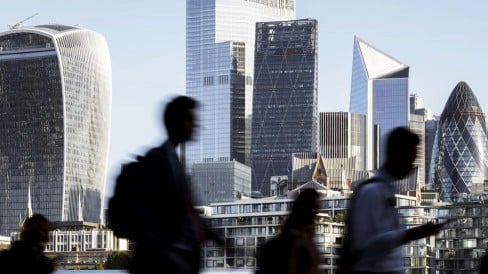
The cap on bankers' bonuses is being removed as part of a post-Brexit shake-up of UK financial rules, it has been confirmed.
The decision was first announced by former chancellor Kwasi Kwarteng last year, who said it would make London a more attractive place to do business.
It was one of the few policies from Mr Kwarteng's mini-budget to remain after most were unwound by his successor.
The cap on bonuses will be lifted from 31 October, the regulator said.
Introduced in 2014 when the UK was part of the EU, the cap was designed to curb excessive risk-taking in the financial services industry in the wake of the 2008 financial crash.
The cap limited how much extra variable pay employees of banks, building societies and investment firms could receive: the maximum was twice their basic salary.
However, bankers may not be popping champagne corks at the news the cap is going, said BBC Business Editor Simon Jack.
While the industry hated the policy when it was introduced, some bankers now prefer the current approach, he said.
Over the last decade banks have compensated for lower bonuses by increasing basic salaries, to make sure they could still compete with other financial centres such as New York and Singapore in attracting the top talent. Many bankers prefer the reliable income.
Even bankers who preferred the old system think it will be difficult to move back to a system of higher bonuses and lower basic salaries quickly.
The decision to end the cap came following a four-month consultation by regulators, the Prudential Regulation Authority (PRA) and the Financial Conduct Authority (FCA), who said the policy had had "unintended consequences".
There was also less room to vary employee pay due to "material poor performance or misconduct", the regulators said.
While critics fear higher bonuses may incentivise more risk-taking, regulators say they have other tools at their disposal, such as being able to defer bonuses or claw them back later if bankers are found to have taken undue risk.
The original decision to abandon the bonus cap was made by the short-lived Liz Truss government last autumn, before turmoil on the financial markets forced her chancellor Mr Kwarteng to step down, followed by the prime minister herself.
Mr Kwarteng had presented the scrapping of the cap as an immediate, political decision, saying: "We're going to get rid of it".
However, on Tuesday the Treasury, under current chancellor Jeremy Hunt, appeared to distance itself from the decision, saying it didn't want to "cut across" the independence of regulators.
"Decisions on remuneration in the banking sector are for the PRA as the independent statutory regulator," a Treasury spokesperson said.
Darren Jones, Labour's shadow chief secretary to the Treasury, said the decision "tells you everything you need to know" about the priorities of the government.
"Rishi Sunak is marking his anniversary of becoming prime minister by pushing ahead with Liz Truss' plan to axe the cap on bankers' bonuses," he added.
Paul Nowak, general secretary of the TUC, called the decision "obscene".
"City financiers are already enjoying bumper bonuses. They don't need another helping hand from the Conservatives," he said.
"At a time when millions up and down the country are struggling to make ends meet - this is an insult to working people."